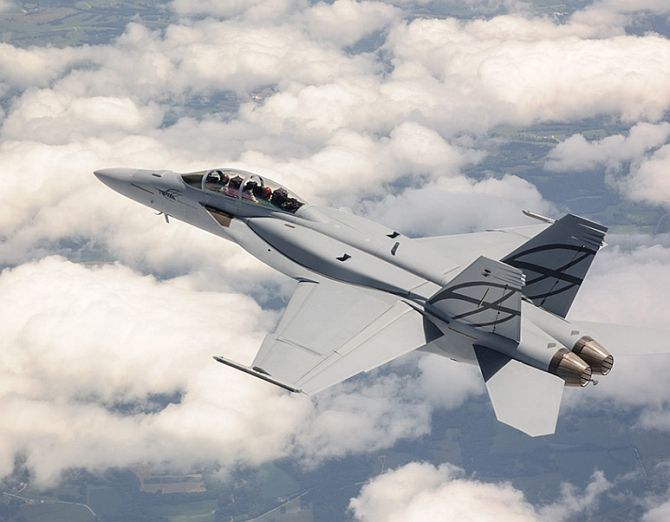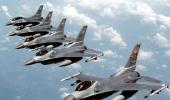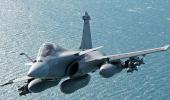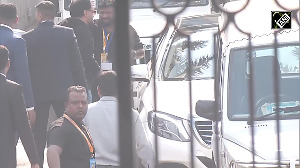Boeing expects the IAF to soon place an inquiry for twin-engine fighter jets to bridge a 200-aircraft gap in its armoury. And the Super Hornet is ready to fly in, reports Ajai Shukla.

The Indian Air Force has already approached major global fighter vendors, inviting them to build single-engine, medium fighters in India.
Now the spotlight is expanding to encompass heavier, twin-engine fighters as well.
On Thursday, November 3, Pratyush Kumar, president, Boeing India revealed that he expected a second inquiry from the IAF, asking international manufactures for interest in building twin-engine fighters in the country.
Along with other vendors, Boeing had received the earlier inquiry for single-engine fighters. With nothing to offer in that category, Boeing wants to sell and build the twin-engine F/A-18E/F Super Hornet -- the US Navy's frontline fighter.
Boeing had offered the Super Hornet in response to India's 2007 tender for 126 medium multi-role combat aircraft, but lost out to the twin-engine Rafale fighter, fielded by French aerospace vendor, Dassault.
Even so, with New Delhi having procured just 36 Rafale fighters, Boeing assesses that, even after buying single-engine fighters, the IAF will face a major shortfall of twin-engine fighters.
Kumar told media persons in New Delhi: 'There is a gap of about 200 fighter aircraft that the Super Hornet can fill, including the naval requirement. This is the assessment of Boeing.'
Like the Rafale, the Super Hornet can operate from land-based airfields, and also aircraft carriers. The US military only uses it off aircraft carriers, but other air forces, such as the Royal Australian Air Force, operate the Super Hornet off land bases.

Boeing has already submitted a plan through the US-India Defence Technology and Trade Initiative, a government-industry coordinating body, to build the Super Hornet in India.
Unlike "other companies" that are offering to shift existing lines, says a politely dismissive Kumar, in a thinly-disguised swipe at Lockheed Martin, Boeing would establish "A brand new, state-of-the-art factory of the future."
Boeing's global arch-rival, Lockheed Martin, the world's largest defence corporation (Boeing is the second-largest), has offered to shift its older F-16 line from Fort Worth, Texas to build the single-engine fighter in India.
The F-16 faces competition in the single-engine category from the Gripen E, which Swedish company Saab has offered to build in India.
Saab has sweetened its proposal with an offer to assist the Defence Research and Development Organisation with completing an improved version of the indigenous Tejas light fighter, called the Tejas 1A.
Boeing's competition in the twin-engine fighter segment comes from Dassault and Eurofighter.
Usually well-informed sources say Dassault, buoyed by its sale of 36 ready-built Rafale fighters to the IAF, is readying a proposal to build a significantly larger number in India.

Boeing, unlike other fighter manufacturers, leverages its military business in India with a major non-military presence in the world's fastest-growing market for airliners.
Kumar argues that Boeing's dual presence -- in civilian and defence aerospace -- creates a compelling business case for establishing manufacturing facilities in India.
"Manufacturing volumes are needed to create a business case for manufacturing in another country. In defence, volumes are initially limited. So it is a great advantage when commercially viable volumes come from defence and civilian business combined," he explains.
Boeing is readying to generate those volumes. In June, Defence Minister Manohar Parrikar inaugurated a new manufacturing facility in Hyderabad, where 300 employees will build fuselages for Boeing's Apache AH-64E attack helicopter, which India has contracted to buy.
The facility, which will become the world's sole source for Apache fuselages, is owned by a joint venture between Boeing and Tata Advanced Systems Limited, called Tata Boeing Aerospace Limited.
Kumar says the facility will commence production in mid-2017 and the first fuselages will roll out in 2018.
In similar fashion, the current Super Hornet line in St Louis, Missouri, US would eventually shut down, leaving only the Indian line to fill global orders for new aircraft and spares.











